ESIL Series
The volumes:
La collection de livres de la Société européenne de droit international (SEDI) publie des ouvrages de haute qualité sur divers thèmes du droit international. À cette fin, le Conseil de la SEDI a élargi le champ de la collection au-delà des thèmes abordés lors des conférences annuelles et des événements conjoints de la SEDI.
Les propositions fondées sur les événements IG ainsi que sur d’autres manifestations de la SEDI, de même que les propositions émanant de membres de la SEDI relevant du champ de la collection, sont les bienvenues.
Les éditeurs potentiels sont invités à contacter les directeurs de la collection, Christian J. TAMS and Machiko KANETAKE, pour soumettre des propositions d’ouvrages collectifs destinés à façonner l’avenir des publications scientifiques de la SEDI.
Les ouvrages de la collection seront soumis à un processus d’évaluation en double aveugle par un comité éditorial de haut niveau, en collaboration avec les éditeurs de la collection, et seront publiés par Oxford University Press.
Volume 7:
International Law and Universality edited by Işıl Aral and Jean d’Aspremont (2024)
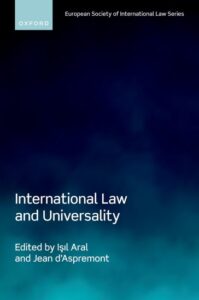
Description:
This book takes an unflinching look at the roles and functions played by the idea of universality in international legal discourses, as well as the narratives of progress that often accompany it. In doing so, it provides a critical appraisal of the mechanisms of inclusion and exclusion attendant to international law and its universalist discursive strategies. Universality is therefore not reduced to the question of the geographical outreach of international law but is instead understood in terms of boundaries. This entails examining how the idea of universality was developed in the dominant vernaculars of international law – primarily English and French – before being universalised and imposed upon international lawyers from all traditions.
This analysis simultaneously offers an opportunity to revisit the ideologies that constitute the identity of international lawyers today, as well as the socialisation and legal educational processes that international lawyers undergo. With an emphasis on the binaries that arise from the invocation of the idea of universality in international legal discourses, this book sheds new light on the idea of universality as a fraught site of contestation in international legal discourses.
Contributors: Işıl Aral, Jean d’Aspremont, Gail Lythgoe, Ekaterina Yahyaoui, Matthew Nicholson, Frédéric Mégret, Mark Retter, Akbar Rasulov, Tilmann Altwicker, Lorite Alejandro, Régis Bismuth, Mashood Baderin, Mohammed Shahabuddin, Markus Beham, Milan Tahroui, Andreas Kulick, Kanad Bagchi, Elisabeth Roy Trudel, Maiko Meguro, Zinaida Miller
Volume 6:
Secondary Rules of Primary Importance in International Law, edited by Gábor Kajtár, Başak Çali, and Marko Milanovic (2022)
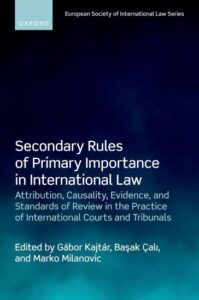
Description: The focus of this edited volume is the often-overlooked importance of secondary rules of international law. Secondary rules of international law – such as attribution, causality, and the standard and burden of proof – have often been neglected in scholarly literature and have seen fragmented application in international legal practice. Yet the systemic nature of international law entails that coherent and consistent application of such rules is a key element in reinforcing the legitimacy of decisions of international courts and tribunals. Accelerated development of international law and international litigation, coupled with the fragmented nature of the adjudicatory terrain calls for theoretical scrutiny and systemic analysis of the developments in the judicial treatment of secondary rules.
Contributors: Alexandra Ellen Hansen, Alice Ollino, Başak Çali, Catherine Gascoigne, Christina Binder, Christopher Lentz, Eyal Benvenisti, Gábor Kajtár, Jure Zrilic, Katalin Sulyok, Lukasz Gruszczynski, Marko Milanovic, Martin Jarrett, Stephan Wittich, Tilmann Altwicker, Vladyslav Lanovoy
Volume 5:
The Protection of General Interests in Contemporary International Law, edited by Massimo Iovane, Fulvio M. Palombino, Daniele Amoroso, and Giovanni Zarra (2021)
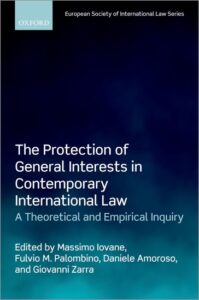
Description:This book analyses three key concepts, global public goods, global commons, and fundamental values, as tools geared towards the protection of the general interests of the international community. After providing an overview of these concepts, the book examines how international law has responded to them in a wide range of fields, and investigates how global governance has improved, or worsened, this response. Contributions from a group of experts explore the legal foundations of general interests, and discuss which interests have or have not been deemed to deserve the protection of international law. Other chapters focus on whether, and to what extent, it is appropriate that international law intervenes to regulate such interests, considering the interplay between multiple actors including states, international and regional organisations, and non-state actors. The book explores how states and other actors have used international law to protect general interests, what lessons can be learned from these efforts, and what significant challenges still need to be addressed.
Contributors: Paula Almeida, Daniele Amoroso, Christine Bakker, Giulio Bartolini, Daniel Behn, Francesca Capone, Samuel Cogolati, Ole K. Fauchald, Winfried Huck, Massimo Iovane, Andrzej Lang, Malcolm Langford
Nilufer Oral, Fulvio M. Palombino, Ernst Ulrich Petersmann, Pierfrancesco Rossi, Dana Schmalz, Antonio Segura Serrano, Fulvia Staiano, Peter Tobias Stoll, Christian Tietje, Ana Filipa Vrdoljak, Jan Wouters, Giovanni Zarra
Volume 4:
Migration and the European Convention on Human Rights, edited by Başak Çalı, Ledi Bianku, and Iulia Motoc (2021)
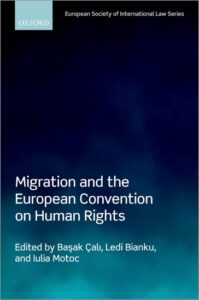
Description: This edited collection investigates where the European Convention on Human Rights as a living instrument stands on migration and the rights of migrants. This book offers a comprehensive analysis of cases brought by migrants in different stages of migration, covering the right to flee, who is entitled to enter and remain in Europe, and what treatment is owed to them when they come within the jurisdiction of a Council of Europe member state. As such, the book evaluates the case law of the European Convention on Human Rights concerning different categories of migrants including asylum seekers, irregular migrants, those who have migrated through domestic lawful routes, and those who are currently second or third generation migrants in Europe. The broad perspective adopted by the book allows for a systematic analysis of how and to what extent the Convention protects non-refoulement, migrant children, family rights of migrants, status rights of migrants, economic and social rights of migrants, as well as cultural and religious rights of migrants.
Contributors: Ledi Bianku, Eva Brems, Başak Çalı, Stewart Cunningham, Marie-Bénédicte Dembour, Kristina Hatas, Francesca Ippolito, Violeta Moreno-Lax, Iulia Motoc, Carmen Pérez González, Bianca Selejan-Gutan, Ksenija Turkovic.
Volume 3:
How International Law Works in Times of Crisis, edited by George Ulrich and Ineta Ziemele (2019)
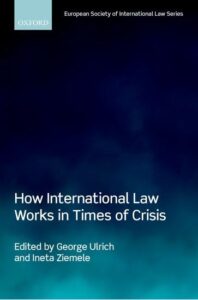
Description: This volume brings together an expert group of scholars to address the question of how international law confronts crises today in terms of legal thought, rule-making, and rule-application. The editors have characterized international law and crisis discourse as one of a dialectical nature, and have grouped the articles contained in the volume under four main themes: security, immunities, sustainable development, and philosophical perspectives. Each theme pertains to an area of international law which at the present moment in time is subject to notable challenges and confrontations from developments in human society. The surprising general conclusion which emerges is that, by and large, the international legal system contains concepts, principles, rules, mechanisms and formats for addressing the various developments that may prima facie seem to challenge these very same elements of the system. Their use, however, requires informed policy decisions.
Contributors: Carlos Espaliú Berdud, Stephen Bouwhuis, James Crawford, Stefano Dominelli, Ilze Dubava, Patrycja Grzebyk, Kushtrim Istrefi, Zeynep Kivilcim, David Kosař, Sandra Krähenmann, Irena Nesterova, Jan Petrov, Ignacio de la Rasilla, Ilze Ruse, Jean-Marc Sauvé, Annalisa Savaresi, Fernando Dias Simões, Pavel Šturma, Ozlem Ulgen, George Ulrich, Ineta Ziemele.
Volume 2:
The European Convention on Human Rights and General International Law, edited by Anne van Aaken and Iulia Motoc (2018)
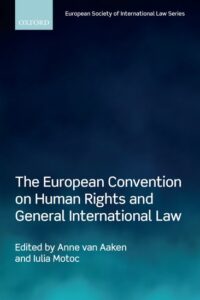
Description: This book explores the interaction, including the problems arising in the context of human rights, between the European Convention on Human Rights and general international law. It contributes to ongoing debates on the fragmentation and convergence of international law from the perspective of international judges as well as academics. Some of the chapters suggest reconciling methods and convergence while others stress the danger of fragmentation. The focus is on specific topics which have posed special problems, namely sources, interpretation, jurisdiction, state responsibility and immunity.
Contributors: Anne van Aaken, Hasan Bakirci, Samantha Besson, Antonio Augusto Cancado Trindade, James Crawford, Isil Karakas, Amalia Keene, Marko Milanovic, Iulia Motoc, Angelika Nußberger, Riccardo Pavoni, Paulo Pinto de Albuquerque, Guido Raimondi, Anja Seibert-Fohr, Linos-Alexandre Sicilianos, Geir Ulfstein, Johann Justus Vasel, Ganna Yudkivska, Ineta Ziemele.
Volume 1:
The Judicialization of International Law. A Mixed Blessing?, edited by Andreas Follesdal and Geir Ulfstein (2018)
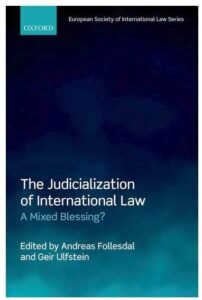
General Editors:

Christian J. Tams
Christian J. Tams is Professor of International Law at the University of Glasgow where he directs GCILS, the Glasgow Centre for International Law & Security.
He studied law at the universities of Kiel, Lyon III and Cambridge (LLM, PhD), and is a qualified German lawyer (admitted in 2005).His scholarship is primarily doctrinal, with particular focus on dispute settlement, investment law and State responsibility.
Recent works include a new edition of The Statute of the International Court of Justice (Zimmermann/Tams, Oxford 2019) and Self-Defence against Non-State Actors (co-authored with O’Connell and Tladi, Cambridge 2019).
He is the Review Editor of the European Journal of International Law, a member of the Council of the German Society of International Law and an emeritus fellow of the Young Academy of Scotland.
An academic member of Matrix Chambers, he is frequently instructed in inter-State and investment disputes, and in recent years, has acted in proceedings before the International Court of Justice, the Iran-US Claims Tribunal and arbitral tribunals.

Machiko Kanetake
Machiko Kanetake is an Associate Professor in Public International Law at Utrecht University and the Director of the Master’s Programme in Public International Law in Utrecht.
Her research interests lie at the intersection of security and human rights. She is also interested in interfaces between domestic and international law.
She served as an editorial board member of the Leiden Journal of International Law and contributed to the ESIL as a Coordinating Committee member of the Interest Group on International Courts and Tribunals in 2018-2023. In addition, she co-organised the 2022 ESIL Annual Conference in Utrecht. In 2022-2024, she served as a member of the ESIL’s Diversity Advisory Body.
She was previously a postdoctoral researcher at the University of Amsterdam. She has held visiting fellowships at the NYU School of Law and the Human Rights Program at Harvard Law School. She obtained her PhD degree from Kyoto University.
Personal profile
Series Editors:

Başak Çalı
Başak Çalıis Professor of International Law at Hertie School of Governance, Berlin and Director of Centre for Global Public Law, Koç University, Istanbul. Her principal research interests are human rights in international law, comparative human rights law, international legal theory and domestic reception of international law. She is the author of ‘Authority of International Law: Obedience, Respect and Rebuttal (OUP, 2015) and editor of International Law for International Relations (OUP 2010). Personal profile

Carlos Espósito
Carlos Espósito is Professor of Public International Law at the Autonomous University of Madrid. Carlos was Vice President of the European Society of International Law (2011- 2014). Former Counselor and Deputy Legal Advisor at the International Law Department of the Spanish Ministry of Foreign Affairs and Cooperation (2001-2004). He has published extensively on general international law, including numerous articles in journals and reviews, and seven books as author or editor. He has blogged at aquiescencia.net, an international law blog in Spanish, since 2008. Carlos studied law at the University of Buenos Aires, and earned his doctorate from the Autonomous University of Madrid in 1995. Personal profile

André Nollkaemper
André Nollkaemper is Dean and Professor of Public International Law at the Faculty of Law of the University of Amsterdam. He is also external Legal Advisor to the Minister of Foreign Affairs of the Netherlands, Member of the Permanent Court of Arbitration and Member of the Royal Netherlands Academy of Arts and Sciences. Between 2014 and 2017 he was President of the European Society of International Law. Personal profile

Yuval Shany
Yuval Shany is the Hersch Lauterpacht Chair in International Law and former Dean of the Law Faculty of the Hebrew University of Jerusalem. He also currently serves as the Vice Chair of the UN Human Rights Committee, as the Academic Chair of the Minerva Center for Human Rights at the Hebrew University, and as a Vice President for Research at the Israel Democracy Institute. Prof. Shany received his LL.B. cum laude from the Hebrew University, LL.M. from New York University and Ph.D. in international law from the University of London. His principal research interests are international courts and tribunals, international human rights law, international humanitarian law and international regulation of cyberspace. Personal profile

Anne van Aaken
Anne van Aaken (Dr. iur. and MA Economics) is an Alexander von Humboldt Professor for Law and Economics, Legal Theory, Public International Law and European Law at the University of Hamburg, and has been a guest professor at several universities in the United States (NYU and Columbia), Europe, Latin America, Africa and Asia. She was Vice-President of the European Association of Law and Economics and Vice-President of the European Society of International Law. Personal profile
Editorial Board Members:

Philip Alston
Philip Alston is the John Norton Pomeroy Professor, School of Law, New York University. His scholarship has focused primarily on international human rights law. From 1996 to 2007 he was the Editor-in-Chief of the European Journal of International Law, and it was in that capacity that he convened the meeting in May 2001 that led to the launching of the European Society of International Law. Personal profile

Andrea Bianchi
Andrea Bianchi has been a Professor of International Law at the Graduate Institute in Geneva since 2002. His research interests range from international law theory to treaty interpretation, jurisdictional immunities and counterterrorism. He has recently authored “International Law Theories: An Inquiry Into Different Ways of Thinking” (OUP, 2016). Personal profile

Laurence Boisson de Chazournes
Laurence Boisson de Chazournes is Professor of International Law and International Organization at the University of Geneva. She has published widely in various areas covering, inter alia, international economic law, international environmental law and dispute settlement. She was President of ESIL between 2012 and 2014 and has been a member of its board. She is also a member of the editorial boards such as AJIL, EJIL, IOLR. Personal profile

Jutta Brunnée
Jutta Brunnée is Professor of Law and Metcalf Chair in Environmental Law at the University of Toronto. She is co-author of “International Climate Change Law” (OUP, 2017), and of “Legitimacy and Legality in International Law: An Interactional Account” (CUP, 2010). Professor Brunnée has authored numerous articles on topics of international environmental law and international law, and is co-editor of the “Oxford Handbook of International Environmental Law” (OUP, 2007). She served on the Board of Editors of the American Journal of International Law (2006-16) and was elected Fellow of the Royal Society of Canada in 2013. In 2019, she will deliver a course at the Hague Academy of International Law. Personal profile

Monica García-Salmones Rovira
Monica García-Salmones Rovira is Adjunct Professor of International Law at the University of Helsinki and Research Fellow at the Erik Castrén Institute of International Law and Human Rights. Her research and teaching focus on international legal theory, history and philosophy of international law. Her publications include “The Project of Positivism in International Law”, winner of the ESIL Book Prize 2015. Personal profile

Lauri Mälksoo
Lauri Mälksoo is Professor of International Law at the University of Tartu in Estonia. He is associate member of the Institut de droit international and member of the Estonian Academy of Sciences. He is the author of “Russian Approaches to International Law” (OUP, 2015) and co-editor of “Russia and the European Court of Human Rights: the Strasbourg Effect” (CUP, 2017). He was member of the ESIL executive board in 2008-2016. Personal Profile.

Georg Nolte
Georg Nolte is Professor of International Law at Humboldt University Berlin (since 2008). He is a Member of the International Law Commission (since 2007, Chair in 2017) and an Associate Member of the Institut de Droit International. His recent publications include “Treaties and Subsequent Practice”, OUP 2013 (ed.), and “The Charter of the United Nations: A Commentary”, OUP 2012, (co.-ed. with Bruno Simma, Daniel-Erasmus Khan and Andreas Paulus). From 2013-2017 he was President of the German Society of International Law. Personal profile

Nilufer Oral
Nilufer Oral is a member of the law faculty at the Istanbul Bilgi University. She is a member of the International Law Commission (2017-2021) and a Distinguished Senior Scholar with the Law of the Sea Institute at the University of California Berkeley. She has lectured at the United Nations Regional Courses in International Law and the Rhodes Academy for the Law of the Sea. Dr. Oral served as Chair of the IUCN Academy on Environmental Law and is a member of the Steering Committee of IUCN World Commission on Environmental Law. Dr. Oral is the Series editor for the International Straits of the Worldpublications (Brill). She has numerous publications on the law of the sea and international law. Personal profile

Armin von Bogdandy
Armin von Bogdandy is director at the Max Planck Institute for Comparative Public Law and International Law in Heidelberg and Professor in Frankfurt/Main. He has been President of the OECD Nuclear Energy Tribunal as well as a member of the German Science Council (Wissenschaftsrat) and the Scientific Committee of the European Union Agency for Fundamental Rights. He is the recipient of the Leibniz Prize. Personal profile
